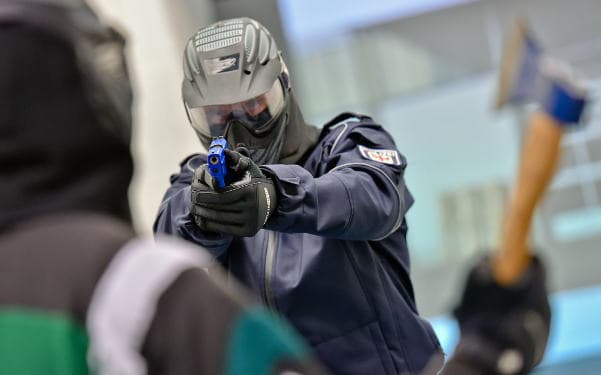German police killed 7, wounded 31 in 2014

Statistics released on Friday show that the police killed seven people in 2014, slightly above the long-term average.
The figures, released by the Interior Ministers' Conference, also show that 31 people were injured in police shoot-outs.
In total police officers shot at civilians 46 times during the year. Most of these, 41 of the cases, were acts of self-defence. Six of the seven deaths resulted from acts of self-defence.
Because the police didn't always hit their targets, there were fewer injuries and deaths than overall incidents of shooting.
In one case a police officer shot someone dead while they were running away.
On average police shot at civilians once every eight days in 2014, slightly more regularly than the long-term average of once every ten days.
In 2014 there was also one bystander who was injured as a result of police fire.
The statistics from the Interior Ministers' Conference also show that in 2014 police used their weapons 10,157 times against animals, either because they posed a danger or because they were injured or sick.
In 46 incidents police also shot at objects such as doors and car tyres.
Police shooting trauma hits hard
A 2009 study by the policeman Oliver Tschirner shows that police officers who have used their weapons against civilians regularly suffer acute trauma.
For his Masters thesis at the Police College in Münster, Tschirner showed that only a third of officers who have killed someone in service make a quick return to regular duty.
One third eventually eventually return but end up performing a desk job. The other third are seriously traumatized and require therapy over years.
Comments
See Also
The figures, released by the Interior Ministers' Conference, also show that 31 people were injured in police shoot-outs.
In total police officers shot at civilians 46 times during the year. Most of these, 41 of the cases, were acts of self-defence. Six of the seven deaths resulted from acts of self-defence.
Because the police didn't always hit their targets, there were fewer injuries and deaths than overall incidents of shooting.
In one case a police officer shot someone dead while they were running away.
On average police shot at civilians once every eight days in 2014, slightly more regularly than the long-term average of once every ten days.
In 2014 there was also one bystander who was injured as a result of police fire.
The statistics from the Interior Ministers' Conference also show that in 2014 police used their weapons 10,157 times against animals, either because they posed a danger or because they were injured or sick.
In 46 incidents police also shot at objects such as doors and car tyres.
Police shooting trauma hits hard
A 2009 study by the policeman Oliver Tschirner shows that police officers who have used their weapons against civilians regularly suffer acute trauma.
For his Masters thesis at the Police College in Münster, Tschirner showed that only a third of officers who have killed someone in service make a quick return to regular duty.
One third eventually eventually return but end up performing a desk job. The other third are seriously traumatized and require therapy over years.
Join the conversation in our comments section below. Share your own views and experience and if you have a question or suggestion for our journalists then email us at [email protected].
Please keep comments civil, constructive and on topic – and make sure to read our terms of use before getting involved.
Please log in here to leave a comment.